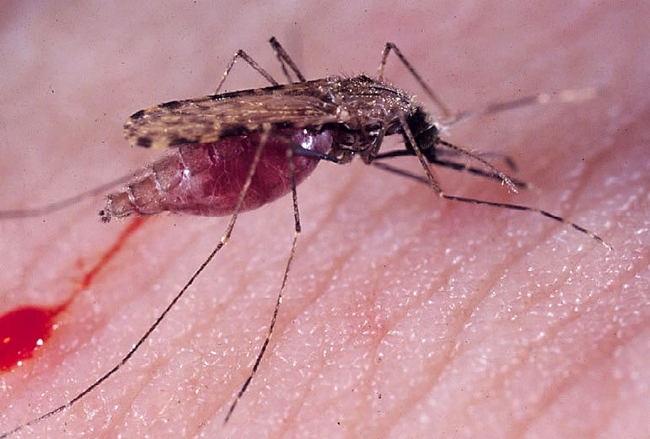Posts Tagged: genome
Honey Bees and Malaria
You don't usually see "honey bees" and "malaria" in the same sentence. That won't be the case, though, when Joseph DeRisi, a Howard Hughes Medical...

A honey bee heads toward a tower of jewels (Echium wildpretii). (Photo by Kathy Keatley Garvey)

The malaria mosquito, Anopheles gambiae. (Photo by Anthony Cornel, UC Davis)
'The Manhattan Project of Entomology'
It's been dubbed "The Manhattan Project of Entomology."And it may have "the potential to revolutionize the way we think about insects," says Richard...

Gene Robinson of the University of Illinois, shown here following his Jan. 6 talk at UC Davis, is heavily involved in "The Manhattan Project of Entomology." (Photo by Kathy Keatley Garvey)
New funding to study wheat and forest genetics
Roger Beachy, the director of the USDA National Institute of Food and Agriculture, was at UC Davis yesterday to announce grants for agricultural research amounting to $40 million, calling them "significant investments," said a UC Davis news release.
Together with UC Davis officials, Beachy announced that:
- Wheat geneticist Jorge Dubcovsky will receive $25 million to develop new varieties of wheat and barley. Dubcovsky and his 55 university and USDA colleagues will focus on biological and environmental stresses to wheat that are caused, at least in part, by global climate change.
- Forest geneticist David Neale will receive $14.6 million to head a team that will work to sequence the genomes of loblolly pine and two other conifers. Neale and his research colleagues plan to accelerate breeding efforts for fast-growing varieties of these trees to enhance their use as feedstocks for biofuels and biopower.
"We look forward to the practical solutions for agriculture and for the environment that will arise from these collaborative projects," UC Davis Chancellor Linda Katehi said at the press conference.
A story about the grants written by Rick Daysog of the Sacramento Bee said they come as UC Davis has stepped up efforts to attract research grants following Katehi's appointment as chancellor in 2009. During its fiscal year ending June 30, 2010, the university received a record $679 million in research grants.

Left to right: David Neale, Jorge Dubcovsky, Linda Katehi, Roger Beachy, Neal Van Alfen.
More federal funds for California farm research
The economy is floundering, but federal money is still flowing. Last week, the U.S. Ag Secretary, Tom Vilsack, announced $7 million in grants for research on the biology of plant processes and traits which can be used to breed crops with greater value and resilience to climate stress, according to a USDA press release.The release said $448,000 of the funds go to UC Davis, where scientists will use the money to better understand plant biology "from the genome to the field."
The "genome" refers to all of the hereditary information encoded in DNA. The phrase "genetic makeup" is sometimes used to mean the genome of a particular individual or organism.
In what may or may not be related to the USDA genome-to-field funding release, the National Science Foundation announced yesterday it has made 32 new awards totaling $101.6 million during the 12th year of its Plant Genome Research Program. The NSF news release says UC Davis and UC Berkeley will recive a share of the funding to address new, testable hypotheses for the mechanism of hybrid vigor in plants.
According to NSF, the development of genomics tools and sequence resources enables "exciting, new comparative approaches and predictive modeling to uncover gene networks that regulate plant development and growth in changing environments."
If that's the news release, can you imagine how complex the research reports must be?

USDA photo.

